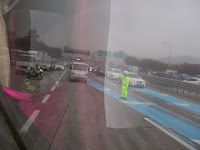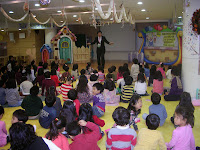This weekend was all about the Korean churches' generosity, hospitality, and organizational capacity. Seriously. Basically, 600 of us travelled from Busan to Seoul for the weekend and the Korean churches took care of all the details.
We left Busan early yesterday morning - a long bus ride to the train station. There was
an entire train just for WCC delegates, which was pretty neat. It was cool and pouring rain when we arrived in Seoul... ugh. But everything was very well organized and we were on assigned buses (28 of them!) within minutes.
 |
| Police stopping highway traffic for us |
We had a police escort as we travelled to the
de-militarized zone (which sometimes stopped several lanes of traffic so our bus convoy could stay together... I felt like royalty!). Our destination was actually
Imjingak, a park about 7 km from the DMZ. (And by the time we got there, the rain had stopped :).) The most interesting parts to me were a fence that was covered in ribbons with prayers or names, and the Bridge to Freedom, where former prisoners of war crossed into South Korea after the signing of
the armistice agreement that ended hostilities. It is blocked today,
and people can no longer pass through it to get to the north.
 |
| Wall blocking the way on the Bridge to Freedom |
We then travelled to
Myungsung Presbyterian Church in Seoul for dinner and a Korean cultural night. This was my first experience visiting a "mega church," and I'm not sure that my words here will do it justice. We were met by several people from the congregation, as well as traditional Korean drummers and dancers. They were performing in a plaza of sorts that is surrounded by the church's buildings (yes, buildings. with an s.). We used an escalator (!) to go down to the cafeteria of the church, where they proceeded to serve all of us a wonderful buffet dinner, complete with lobster and smoked salmon. (No crust-less egg salad sandwiches in sight!)
 |
| Myungsung sanctuary (photo: WCC) |
|
The Korean Cultural Night was an amazing display of talent - traditional
dances, an amazing performance by a children's choir, wonderful pieces
from a full orchestra, soloists and choir, and a short musical about the
history of Korea. All of this done in their sanctuary, which I think
probably seats more people than some good-sized cultural centres in Canada.
The delegates split into groups after the performance, based on where we would be attending church on Sunday morning. Six of us were headed to Somang Presbyterian Church, so our guides took us on a bus to the Gangnam neighbourhood of Seoul (yes,
that Gangnam). They put us up in a lovely hotel for the night, and then we were off to church the next morning.
Somang (meaning "hope" in Korean) is another mega-church, though smaller than Myungsung. Here are some of the figures we got from our guides:
- the church has 70,000 members
- almost 1,000 Sunday School teachers
- two libraries (one for adults, one for children)
- seating for 2,500 in the sanctuary (and it was full for the service we were at - one of six every Sunday)
- at least 100 people in the choir for the service we attended
- it took 30 people to collect the offering
 |
| Sunday School class at Somang |
I'm not sure that I have yet wrapped my head around these numbers and how exactly a church like this would function. That said, the service format was very similar to that of my church in Ottawa, so it was fairly easy to follow. We had a lovely lunch with our hosts afterward, and we were then back to the train station for our return to Busan.
A very full weekend, but we were treated so well by our hosts and every small detail was taken care of. It was amazing.











